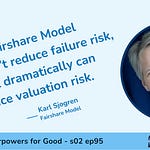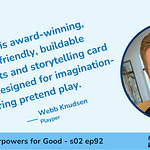When you purchase an item after clicking a link from this post, we may earn a commission.
Devin: What do you see as your superpower?
Richard: My superpower is really easy. I have the gift of being able to find people.
Richard Villasana has the superpower of a real superhero. He finds the parents of children who have been separated from them. One of his biggest customers is the US Federal Government, now striving to clean up the mess from the Trump Administration’s Zero Tolerance policy.
Richard leads the nonprofit Forever Homes for Foster Kids. With a history that stretches back three decades, the organization has long specialized in finding lost relatives for kids who can’t live with their parents.
AI Summary
Richard Villasana founded Forever Homes for Foster Kids, an organization that works to find family members of foster and immigrant children to give them a permanent home.
The federal government contacted the organization to help find parents separated from their children under the Trump administration’s zero-tolerance program.
The nonprofit’s success rate at finding parents is around 93 percent, and when they cannot find a parent, they try to locate other relatives.
Many of the parents fear talking to anyone, even those who can help bring them back to the US legally to reunite with their children.
Violence and corruption, along with poverty, drive people from Central American countries to flee to the US.
The difficulty in finding and matching immigrant children with relatives outside of the US is a challenge these children face in foster care.
Villasana’s superpower is his ability to find people, which has helped him successfully locate and reunite immigrant children with their relatives around the world.
His skill is a blend of empathy, intuition and research, and he constantly works to improve and refine his gifts.
Villasana has also written a book named Do No Harm, which highlights the failures of the foster industry and explains how to improve it.
The podcast discusses the current state of separation of children from their families at the US-Mexico border and its impact on immigrant children in foster care.
For many years, families have been crossing the border into the United States seeking asylum. Richard explains what changed in 2017:
In 2017, the Trump administration came up with a plan to mitigate/reduce those numbers because they were massive numbers coming across the border and asking for asylum.
What they came up with was an idea called Zero Tolerance. It was a pilot program. And that's an important distinction because it was not an official policy. So we started this in early 2017 in the El Paso, Texas area.
The idea was this: Anybody who set foot on US soil and asked for asylum, they would immediately have their children separated from them if they came as a family. And this was a huge shift because until then unless we were really extenuating circumstances, parents and children were never separated.
So this happened in 2017, and that's why people probably heard in the last several years about all these facilities popping up, people being moved from Texas all over the United States. Hundreds ended up in New York, for instance; there were over 700 at one time. They were dropped on them and needed to be cared for. This was all part of zero tolerance.
This went on until June 2018, when this policy became official. At that point, the ACLU stepped in, and they were able to go to the courts because now it was an official policy. The courts agreed that this was illegal based on the Fifth Amendment, and at that point, told the administration, you have to stop.
Richard and I discussed the tragic underlying causes of trouble in Central America that lead to pressure to migrate. Be sure to tune into the podcast for that.
With the new Administration in 2021, Richard’s organization got the call from the Federal Government. “They said, ‘Look, we have got cases. We need someone who can step in and help us. We need help,” he says.
“I’m very proud to say that our success rate at finding parents is roughly 93 percent,” Richard says.
Kids in foster care are a challenge much more extensive than just the kids at the border. About 400,000 kids are in foster care.
Richard explains why they are there:
They've been taken away from their parents for whatever reason. Eighteen percent is abuse, physical or sexual abuse, and the rest of it is normally neglect. Parents who just have dogs running rampant and filthy filth all over the place, bad smells, or they just simply leave the kids alone for the weekend. We've read stories about that. Or the five-year-old child is taking care of their three-year-old sister. Neglect.
Richard shared a surprising story with a happy ending to demonstrate the success his nonprofit creates:
There are three girls. They are four, eight and ten. They were in foster care. Now because of their ages, they knew that they had two aunts living in Chicago, but they didn't have phone numbers. They didn't have addresses. They just knew there was Auntie Martha. That's all they could tell the caseworkers. So the caseworkers tried to find relatives in the US.
They came to us because they said, look, we know there are relatives in Mexico, so we'd like you to go look for them. And the reason these agencies come to Forever Homes is because when you have children who are living south of the border, that means their documents are in Spanish.
So they are completely out of their depth when it comes to looking for how to find someone in Brazil, Argentina, Dominican Republic, all places we have done business with, and we have dealt with. So they came to us from Mexico.
It took us two weeks. We found numbers for an uncle. So the caseworker is on the phone. It's Saturday. She has a translator. She's calling down. She gets the uncle on the phone. During the conversation, she says, “Hey, by the way, have you heard of two aunts living in Chicago?”
He says, “Wait a minute.” Woman comes on a line; caseworker introduces herself, asks the same question. “Do you know anything about two aunts living in Chicago? She says. “Of course, I'm one of them.”
The two aunts are having coffee in the living room when the phone call came in. They had flown down and were visiting that week. Of course, the aunt said, “Of course, we'll take the girls in.”
As soon as they got back to Chicago, paperwork was done. The girls are now living with the two aunts in Chicago. That's what we do.
How to Develop Finding People As a Superpower
Richard developed his ability to find people early in his career. It is a gift. He began to appreciate his unique ability when his boss pointed out what a remarkable job he’d done finding someone.
He shares the story of his boss giving him an important assignment:
We were together. He wanted me to find a person who was with the Department of Commerce. He knew he was in Washington, D.C. This is pre-Google. He said, “Try your best to find him.”
I said, “Okay.” Later that day, I dropped a piece of paper off on his desk.
He says, “What's this?”
I said, “That's the phone number.”
He said, “This is the phone number?”
I'm like, “Yes.”
He looks at his watch and he says, “I asked you five minutes ago.”
I'm like, “Well, I tried to be quick.”
He's like, “No, you don't get it. I asked you only five minutes ago.” There was no Google, there was no computer search engine. He said, “Okay, you've got to tell me what you did.”
I said, “Well, I called Maria up at the Economic Development Center. We talked for a moment. She passed me to John in Washington. I talked to John. John got me to Suzanne, and Suzanne gave me the number.” For me, it's like, okay, job done. I'm out of here.
He's like, “I've never seen anyone do that.”
He adds, “A lot of people have called me the Sherlock Holmes of foster care.”
Richard believes that he has a gift that is hard to replicate but also understands that others can do better at finding people when they emulate his model. He offers tips to help you document and train people on any superpower.
First, he notes that you need to build a team.
Second, you’ve got to pay attention to your process and document it.
Third, you’ve got to read and research your gift to continue to hone it.
Finally, he offers a compelling insight for anyone with an exceptional ability:
When we have a gift, we have to be setting our own bar. We don't care about anyone else's bar.
Simone Biles said that she wasn't rating herself on some other gymnast. She said, “I'm only competing with myself.” That's the attitude that will carry someone who has a gift past all the negativity, past all the family members who don't believe in them, the friends who say, “Oh, you're egotistical.” No, it's not ego. It's realizing we have a gift, and we need to do something with it because it will drive us, and we can tap into that. But we have to set our own bar.
By following Richard’s example, you can learn to find people, perhaps even developing it as a superpower that will help you do more good in the world.
Guest-Provided Profile
Richard Villasana (he/him)
Founder, Forever Homes for Foster Kids
About Forever Homes for Foster Kids: Forever Homes for Foster Kids, a 501(c)3 nonprofit, reunites foster and immigrant children with family. For three decades, Forever Homes has specialized in locating a child's relatives who are still living somewhere in Latin America. This ensures that where possible, each foster or immigrant child has at the very least a connection with their blood relatives. Often relatives are found who will give the child a loving forever home.
https://www.foreverhomesforfosterkids.org
Twitter Handle: @familyfindingmx
Company Facebook Page: https://www.facebook.com/familyfindingmx
Biographical Information: Richard Villasana, founder of Forever Homes for Foster Kids, is a leading international authority on immigration issues and foster families. A proud Navy veteran, Richard has been featured on CNN International, Associated Press, ABC TV, Univision, WISH-TV, Costco Connections and the Washington Post. For three decades, his nonprofit has worked with government agencies across the country to find family members of foster and immigrant children to give them a permanent home. He is the author of the new book, "Do No Harm," about the immigrant children separations and this country's foster care crisis.
Twitter Handle: @richardvillasan
Personal Facebook Profile: facebook.com/richardvillasana
Linkedin: https://linkedin.com/in/richardvillasana/
Instagram Handle: https://www.instagram.com/foreverhomesforfosterkidsca/
Richard’s Book: https://www.facebook.com/donoharmthebook
















Share this post